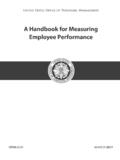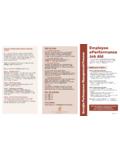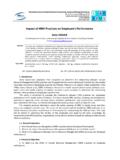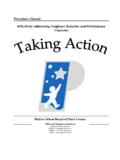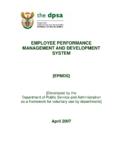Transcription of Employee Recognition and Performance - A Field Experiment
1 Employee Recognition and Performance -A Field ExperimentChristiane Bradler , Robert Dur , Susanne Neckermann , Arjan Non Preliminary draft, October 2011 AbstractRecognition for a job well done is commonly considered as an important management toolfor motivating employees. Existing empirical studies show strong positive correlationsbetween the provision of Recognition and Employee Performance , but often fail to establishcausality. This paper contributes to filling this gap by conducting a Field Experiment ina natural working environment. We hired more than 400 students for a three-hour worked individually on a data entry task in groups of eight. We randomizedthe unannounced provision of Recognition (in the form of handing out a thank-you card)after two hours of work. We find that the provision of Recognition to all workers in a groupincreases subsequent Performance only weakly. In contrast, scarce Recognition that is onlyprovided to the best performers in a group raises subsequent perfomance , workers who did not receive Recognition are responsible for this performanceincrease.
2 These results are consistent with workers having preferences for conformityand being reciprocal at the same time. All effects vanish completely when the reward Classification: C93, M52 Key words: Employee motivation, Recognition , reciprocity, conformity, Field Experiment ZEW Centre for European Economic Research Mannheim Erasmus University Rotterdam ZEW Centre for European Economic Research and University of Mannheim University of Maastricht11 IntroductionRecent years have seen a surge in popular business books on the importance of Recognition foremployee motivation. A prominent book in this Field is Bob Nelson s1001 Ways to RewardEmployees. He starts his book by stating that a number of surveys confirm what almost everyemployee already knows: that Recognition for a job well done is the top motivator of employeeperformance. 1 Other questionnaire studies reveal similar views among practitioners, see amongothers Kovach (1995) and Wiley (1997).
3 The academic literature provides surprisingly little sound evidence for the effects of employeerecognition on work Performance . Most existing studies rely on correlations between theprovision of Recognition and Employee Performance ( Rhoades and Eisenberger 2002,Cropanzano and Mitchell 2005, and Wagner and Harter, 2006). However, as these studiesrecognize, correlation does not prove instance, and quite naturally, goodperformance also causes Recognition , making it difficult to detect a possible causal effect ofrecognition on Performance using observational data.(Quasi-)experimental studies improve on this by exploiting random variation in the type and/oramount of Recognition provided to employees (Neckermann et al., 2010). Experimental studiesare very scarce, though, particularly those conducted in a natural work environment and with areasonable sample paper contributes to fill this important gap in the literature by conducting a large-scale fieldexperiment in a natural working environment.
4 Over the course of November 2010 to May 2011,we hired more than 400 people (mainly students) for a three-hour data entry job. We created awork environment where eight workers shared the same room, but worked individually. Workerswere paid a flat wage of 25 Euro and were not aware that they took part in an Experiment . Arandom sample of workers received Recognition after two hours of work. Recognition consistedof a thank-you card, personally signed by the head of the research institute and handed out by aresearch assistant. Thus, provision of Recognition did not involve any material reward but clearlyshowed the management s appreciation for workers effort. Importantly (and most naturally),1He continues with yet most managers do not understand or use the potential power of Recognition and rewards[..] while money is important to employees, research shows that what motivates them really to perform [..] is thethoughtful, personal kind of Recognition that signifies true appreciation for a job well done.
5 2An early lab Experiment is by Deci (1971), who showed that provision of praise increases students willingnessto work on a puzzle. Stajkovic and Luthans (2003) give an overview of Field -experimental studies on the effectof social Recognition on employees Performance . These studies typically randomize over a handful of plantsand do not correct standard errors for clustering at the plant level. Other Field studies have experimentallyexamined the effects of Recognition on Employee absenteeism (Markham et al., 2002) and on parents willingnessto volunteer for their kids soccer club (Fisher and Ackerman, 1998). Most recently, Neckermann et al. (2010)analyze firm-level data to compare the behavior of employees receiving an award with observationally similaremployees not receiving an award. They find that award recipients significantly increase Performance as comparedto most of the treatments possible provision of Recognition was not announced at the start of thethree-hour working period.
6 Moreover, from the way the thank-you card was presented, workerscould deduct that no further Recognition would be provided in the remainder of the key feature of our Experiment is that we vary the scarcity of Recognition over differenttreatments. In one treatment, all workers in a work group receive the thank-you card. In othertreatments, the thank-you card is given only to the best performer or to the best three performersof a work group, and this is publicly announced when handing out the thank-you main focus is on how the provision of the thank-you card affects subsequent performanceof workers. We argue that three behavioral mechanisms may be operational: signaling by theemployer, reciprocity of employees, and conformity preferences of employees. As we shallsee, our results are consistent with employees having preferences for conformity and beingreciprocal at the same paper proceeds as follows. In the next section, we draw on existing behavioral theoriesto develop hypotheses on the effects of different forms of Recognition .
7 Next, we describe theexperimental set-up in detail in Section 3. Section 4 lays out the empirical strategy and presentsthe results of our experiments. Section 5 TheoryWhy might the provision of a thank-you-card that was not announced affect subsequent effortof workers? And does it matter whether all workers or only the best performing workers ina session receive a thank-you card? We can think of three plausible behavioral mechanismsthrough which a thank-you card may affect subsequent , workers may consider the thank-you card as a gift from the employer and feel inclinedto reciprocate. A natural way to reciprocate is to increase effort in the remainder of thesession. Following the seminal paper by Akerlof (1982) and the influential experimentalwork by Fehr et al. (1993), reciprocity has become a firmly established concept in studies in economics have focused on wages as the employer s means of exchange inreciprocal relationships with workers.
8 An exception is Kube et al. (2011) who show thatnon-pecuniary gifts increase subsequent work effort. Other social sciences have also consideredsocio-emotional gifts that address social and esteem needs (and are often symbolic andparticularistic) (Cropanzano and Mitchell, 2005, p. 881). The thank-you card which is centralto our treatments, clearly falls into this latter category. In treatments where only a subset ofworkers receive a thank-you card, we only expect recipients to respond. Moreover, scarcitymay affect the perceived value of the card, implying a stronger response of recipients when the2number of recipients second reason for why the thank-you card may affect effort is that the card provides a signalto the workers about the employer s type. For instance, the thank-you card may signal theemployer s kindness or care for the workers, which may in turn make workers care more forthe employer and hence increase their effort (Levine, 1998; Dur, 2009).
9 Alternatively, thethank you card may affect workers beliefs about how important their effort is to the to these signaling theories, the thank-you card should affect effort of recipients andnon-recipients identically as all workers receive the signal (the cards are handed out in public).However, the strength of the response may differ between treatments. In particular, providingjust a single card may be seen as a weaker signal of kindness or care for output than providingall workers with a thank-you and last, in the treatments where only the best-performing workers receive a thank-youcard, preferences for conformity may give rise to behavioral responses. Recipients in thesetreatments learn that their Performance belongs to the top within their group. Likewise,non-recipients learn that they belong to the lower ends of the Performance distribution. Ifworkers have a preference for conformity (as in Bernheim, 1994, and Sliwka, 2007) , we expectnon-recipients to increase effort while recipients reduce effort.
10 The effect on non-recipientsshould be less pronounced when the thank-you card is provided to very few workers, as lessinformation is provided about one s standing. Thus, we expect smaller effects for non-recipientsin the treatment where only a single thank-you-card is provided as compared to the treatmentwhere the three best-performing workers receive a thank-you card. Conversely, recipients ofthe card should respond more strongly when fewer thank-you cards are provided. Lastly,conformity preferences predict no treatment effect in the treatment where all workers areprovided with a thank-you card, as no information about one s relative Performance is 1 summarizes our theoretical effect of relative Performance feedback on Performance has recently been studied in a variety of contexts,ranging from student test scores (Bandiera and Larcinese, 2009; Azmat and Iriberri, 2010; Tran and Zeckhauser,2011), contributions to an online community (Chen et al.)

